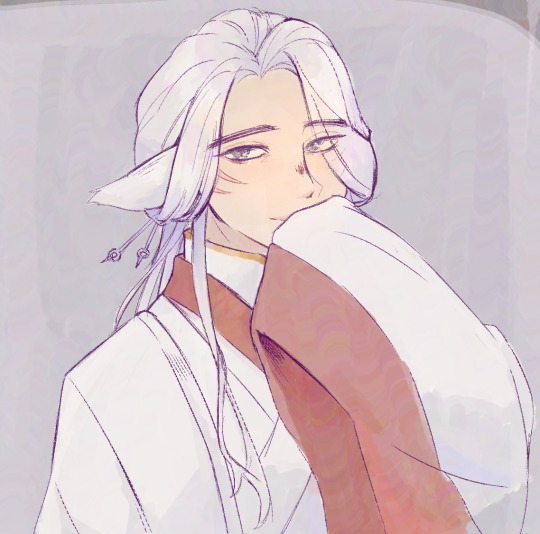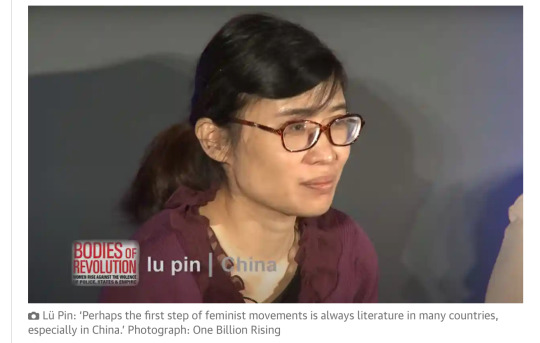#Shiyes
Text
Drevarkh the Enlightened Dies in Arkhangelsk
Andrei Khristoforov aka Drevarkh the Enlightened. Photo courtesy of Mr. Khristoforov’s social media page via Mediazona
Fifty-nine-year-old environmental activist and Shiyes defender Andrei Khristoforov, also known as Drevarkh the Enlightened, has died in Arkhangelsk. The news was reported on his page on the Russian social media network VKontakte.
In late April, Khristoforov said that he had…

View On WordPress
#Andrei Khristoforov#Arkhangelsk Region#Drevarkh the Enlightened#obituary#Russian environmentalists#Shiyes
0 notes
Text

ooo i love him so much ooo
849 notes
·
View notes
Text

The nonbinary lesbians ever
#shiver has eczema you can fight me on it#art#fanart#splatoon#splatoon 3#deep cut#doodle#shiver#frye#shiver and frye#friver#shiye#gay#gay gay homosexual gay
467 notes
·
View notes
Text
My friend and I were discussing TGCF's elemental masters (and how odd the existing ones are. Why water, rain and thunder? Wind and earth are fine) So I created two of them: the Fire Master, and the Metal Master (I have a basic concept for a Wood Master too, but she needs more development)
Fire Master is a chef. He can be a bit hot-headed and has absolutely thrown some people out of his Palace for intruding while he's cooking (yes the gods don't need to eat, but they do eat at banquets and some eat more regularly. While many have in-house servants for this, they can also eat Fire Master's food! Any non-deputy servants typically learn cooking skills in his Palace). He considers anyone who likes good food, drink and has a good appetite to be his friend. He is often kept abreast of any events involving food and he will happily tell all during dinner. He used to be a common dinner companion for SQX and "MY" as he was an excellent source of information (and food) he always liked "MY" and would often send food to his Palace but due to how reclusive "MY" is, it's very hard to call them friends. One thing HX approved of was him outright talking about how he didn't like SWD and saw him as a "big problem". That said, I could see HX missing him after he gets his revenge (I'm choosing to believe that, given some time to understand wtf happened, they could become actually friends. Yes, he would deliver to Nether Water Manor eventually)
Oh, also he has a history with XL. People would pray to him pretty much wherever XL cooked so he'd pretty regularly go "subdue a cooking demon" and he had no idea who he was. If HC had only paid attention to HX when he told him "Fire Master went to battle the cooking demon again" he'd have found XL centuries ago. (He just joked that HX really liked FM) (since HC would hate him if he knew he regularly fought XL and referred to him as a demon, I think it's important to know that his temples are fireproof lmao)
I don't know what kind of spiritual item he has, I think bellows or maybe a fan (I know we already have two, though I originally imagined it as a round fan, similar to the Japanese Uchiwa fan as it has been used to fan flames and with cooking, but I couldn't find any evidence that the Chinese used them similarly? Also round fans are seen as feminine)
Metal Master
Metal Master is more simple. He's a smith, who mostly makes spiritual weapons. He doesn't understand spiritual items with no metal in them lmao, Ruoye especially confused him ("but it's just a cloth...? Where's the metal?"). He mostly keeps to himself in his forge making whatever he wants (several of his strange swords were added to JW's collection. He reclaimed them after JW's fall. There are probably tons in HC's collection too) but he's worshipped by many artisans. However he doesn't like competition and most of his deputy officials are NOT smiths! They are different types of artisans who go and deal with prayers related to their respective specialties. He has a handful of former deputies who have ascended on their own right because of this. He loves a challenge.
Despite his reputation in the heavens, MM is a bit interested in HC. More accurately, he's interested in E'Ming! His dream would be to get a hold of it just so he could try to figure out how it was forged.
While MM avoided XL in order to prevent getting infected with bad luck, he's actually pretty fond of him once they meet. And he crafts delicate silver butterfly pins for him and HC once they get married (he's a himbo but he's not a fool. He knows HC is unlikely to pick a fight with him if he's nice to XL and supports their marriage)
MM is also a very strong god despite not being a martial god. Several martial gods try to "poach" him but he refuses. He just wants to smith! Leave him alone!!
#tgcf#tian guan ci fu#tgcf oc#hob oc#heavens official blessing#hi hello#they have names too#FM is#Chu Shiye (kitchen master and glorious/blazing)#and MM is Jin Shicheng#(gold/metal master and succeed or turn into used in the phrase for forging)#(since all the masters but MY have 'shi' in their names)
8 notes
·
View notes
Text
STOP RN AND STARE AT THEM


#HoLY FICK HOLY SHIYE HOLY MOLYEYE MACARMONII#GK#GOLDEN KAMUY#koito otonoshin#tsukishima hajime#MY KOITSUKI AGENDA NEVER ENDS I NEED TJRM I NEED THEM I NEE#i spek#i just wish they didnt make koito such an ashy light brown <///3#WHERE IS HIS MELANIN
52 notes
·
View notes
Text

Attack on @nin-ei 😳
68 notes
·
View notes
Text

@aver-eesis ‘s character Shiye
16 notes
·
View notes
Note
!!!!!!!!!!!!!!!!!
YAHAHA u get a special one
don't think i ever formally introduced my most beloved, shiye


theyre uh. yea they're the oc i made to ship with jhin HASJGASDJF
theyre a vastaya (bootleg league furries) and i had written them solely as a character study to see under which circumstances love might just be possible for the man, and it kind of spiraled out of control from there <3
#ITS MY BELOVED!!!!#ive never actually formally introduced them outside of my private twitter so im a lil nervous#but its been long enough that im less anxious talking about them on main otl#i love them a lot!#when i got into jhin back in the hayday#i think i drew like. well over several hundred pages of art for them and their relationship#including several animations and a 100+ page gdoc on the Lore tm#when i moved on from jhin for a little to avoid burnout i got such bad rsd i felt like i was going through an actual breakup <3#emotional attachment to blorbos real#cosme screams#an ask#shiye#ocs#slothfuljeremiah#hehe thank u for the ask <3
8 notes
·
View notes
Text
how i get someone to come roleplay shiye with me?? imma break out the rusty roleplaying skills fr!!! semi-lit shiye pls?? 😭😭 pls someone I'm begging .... I'd love to be Frye 😭😭😭
12 notes
·
View notes
Text
compilation of things i thankfully did not post (SO FAR!)




#obsessed with the way you can see exactly when i realized nobody cares#this will not happen when i REVEAL my love life#to hopefully at least two people#please people#follow me#new friends#lets be friends#im board#funny!#fail compilation#draft saved#maybe don't save it#you can back up a little bit#GAY#gay bulge#gay blush#i'm shiye#please follow me
0 notes
Text
you ever post something out of drafts and then spend .2 seconds thinking about it and realize there was a reason you saved to drafts when you wrote it
1 note
·
View note
Text
"Focus": The Lesson of Shiyes
Dmitry Sekushin. Photo courtesy of 7×7
Hi!
This is the 7×7 team on the line. This newsletter has been written by Oleg Gradov. What inspired the environmental protests at Shiyes and why there is no mass protest nowadays is the subject of our newsletter today.
Approximate reading time: 4 minutes.
I’m sorry if you’re from Moscow and our headline hurts your feelings. No one will be scolding the…

View On WordPress
#23 January 2021 pro-Navalny protests#7X7 (Russian web publication)#Arkhangelsk Region#Dmitry Sekushin#Marina Feldt#Oleg Ogradov#Pomors#pro-war Russians#Russian anti-war movement#Russian environmentalists#Shiyes
0 notes
Text



Weird dog
37 notes
·
View notes
Text
Zodiac: Twelve Souls — 31

< PREV | ARCHIVE | NEXT >
Draw
“All that excitement over nothing…”
news
— New translated chapter posted.
— Thinking of taking a break after next week’s chapter. I will write a note if I do.
— Next update target: November 29, 2022
notes
— Draw:
From 和局 (hé jú). Draw as in “tie”: The game ended in a draw.
— Lead, clue, etc.:
Quan Diyan often uses 线索 (xiàn suǒ) to refer to things. Among these include the green scale he took from Wuchang, the message that Shiye intercepted in Year of the Hen, and Wuchang herself.
线 + 索 — Literally, thread/string/wire/line + cable/cord/rope/chain. The term evokes a sense of following a thread to see where it leads. I alternately translate this as clue or lead or thread, depending on how natural it feels in English. For example, a person typically isn’t referred to as a clue, but may be considered a lead.
— All hail:
From 参见 (cān jiàn). An expression used when paying one’s respects. I’ve also translated this term as salutations in the past. See:
Chapter 0.12 (Year of the Pig):
猴兵:参见山君……
Monkey soldiers: All hail the Mountain Lord…
Chapter 18 (Depart):
马不凡:参见牛族长
Ma Bufan: Salutations to the leader of the Ox Clan.
Chapter 31 (Draw):
参见畜王!
All hail the King of Chu!
Definition-wise, “all hail” is pretty appropriate since it is meant to be a general respectful greeting.
Context-wise, the way I tend to see “all hail” used in contemporary media is towards sovereign authority figures, especially when the all-hailer is a subject of that figure. So it feels weird to me, on an instinctive level, to have Ma Bufan say, “All hail the leader of the Ox Clan” — even though it is quite appropriate!
— It’s the absolute truth:
From:
qiān zhēn wàn què
千真万确
A thousand truths, ten-thousand certainties.
< PREV | ARCHIVE | NEXT >
#生肖十二魂#twelvesouls#manhua translation#quan diyan#wuchang#ji shiye#mountain lord#ma bufan#ox clan leader#king of chu#chengyu
0 notes
Note
I SEE BUSINESS AS USUAL LOL<< also i see your cries for dottore brainrot, i may be of assistance we seem to like the same weird stuff idk maybe not bUT< thoughts on dottore being condescending? like patting your head when your ask him a question and always just leaning over you a little (because u are short HA) as a slight intimidation tactic
I will blush and blush and cry and scream and—

CONDENSCENDING PPL IN GENERAL>>> LIEK, it’s basically the same w ayato too because??? Condenscending ayato??¥|$\* MMMFMFMMFMFF I LOVE IR
#ʕ •ᴥ•ʔ mail received#ʕ •ᴥ•ʔ lucey luce#PR LIKE OMG LUCE#U ASK HIM A QUESTION OR SMTHN#AND#AND THEN HE#HE SLIGHTLY HUNCHES OVER UR BODY AND LIFTS UR FACE W HIS INDEX FINGER W A SHIYE EATING GRIAaN#LIEK#ODBSJSEHISAHSJSSIWUW
0 notes
Text
Because large-scale organising is “almost impossible” in China, women are turning to “all kinds of alternative ways to maintain feminism in their daily lives and even develop and transfer feminism to others,” she says. These may take the form of book clubs or exercise meet-ups. Some of her friends in China organise hikes. “They say that we are feminists, we are hiking together, so when we are hiking we talk about feminism.“ - Lü Pin
To find evidence that China’s feminist movement is gaining momentum – despite strict government censorship and repression – check bookshelves, nightstands and digital libraries. There, you might find a copy of one of Chizuko Ueno’s books. The 74-year-old Japanese feminist and author of Feminism from Scratch and Patriarchy and Capitalism has sold more than a million books in China, according to Beijing Open Book, which tracks sales. Of these, 200,000 were sold in January and February alone.
Ueno, a professor of sociology at the University of Tokyo, was little known outside in China outside academia until she delivered a 2019 matriculation speech at the university in which she railed against its sexist admissions policies, sexual “abuse” by male students against their female peers, and the pressure women felt to downplay their academic achievements.
The speech went viral in Japan, then China.
“Feminist thought does not insist that women should behave like men or the weak should become the powerful,” she said. “Rather, feminism asks that the weak be treated with dignity as they are.”
In the past two years, 11 of her books have been translated into simplified Chinese and four more will be published this year. In December, two of her books were among the top 20 foreign nonfiction bestsellers in China. While activism and protests have been stifled by the government, the rapid rise in Ueno’s popularity shows that women are still looking for ways to learn more about feminist thought, albeit at a private, individual level.
Talk to young Chinese academics, writers and podcasters about what women are reading and Ueno’s name often comes up. “We like-like her,” says Shiye Fu, the host of popular feminist podcast Stochastic Volatility.
“In China we need some sort of feminist role model to lead us and enable us to see how far women can go,” she says. “She taught us that as a woman, you have to fight every day, and to fight is to survive.”
When asked by the Guardian about her popularity in China, Ueno says her message resonates with this generation of Chinese women because, while they have grown up with adequate resources and been taught to believe they will have more opportunities, “patriarchy and sexism put the burden to be feminine on them as a wife and mother”.
Ueno, who found her voice during the student power movements of the 1960s, has long argued that marriage restricts women’s autonomy, something she learned watching her own parents. She described her father as “a complete sexist”. It’s stance that resonates with women in China, who are rebelling against the expectation that they take a husband.
Ueno’s most popular book, with 65,000 reviews on Douban, is simply titled Misogyny. One review reads: “It still takes a little courage to type this. I have always been shy about discussing gender issues in a Chinese environment, because if I am not careful, I will easily attract the label of … ‘feminist cancer’.”
“Now it’s a hard time,” says Lü Pin, a prominent Chinese feminist who now lives in the US. In 2015 she happened to be in New York when Chinese authorities arrested five of her peers – who were detained for 37 days and became known as the “Feminist Five” – and came to Lü’s apartment in Beijing. She narrowly avoided arrest. “Our movement is increasingly being regarded as illegal, even criminal, in China.”

China’s feminist movement has grown enormously in the past few years, especially among young women online, says Lü, where it was stoked by the #MeToo movements around the world and given oxygen on social media. “But that’s just part of the story,” she says. Feminism is also facing much stricter censorship – the word “feminism” is among those censored online, as is China’s #MeToo hashtag, #WoYeShi.
“When we already have so many people joining our community, the government regards that as a threat to its rule,” Lü says. “So the question is: what is the future of the movement?”
Because large-scale organising is “almost impossible” in China, women are turning to “all kinds of alternative ways to maintain feminism in their daily lives and even develop and transfer feminism to others,” she says. These may take the form of book clubs or exercise meet-ups. Some of her friends in China organise hikes. “They say that we are feminists, we are hiking together, so when we are hiking we talk about feminism.
“Nobody can change the micro level.”
‘The first step’
In 2001, when Lü was a journalist starting out on her journey into feminism, she founded a book club with a group of friends. She was struggling to find books on the subject, so she and her friends pooled their resources. “We were feminists, journalists, scholars, so we decided let’s organise a group and read, talk, discuss monthly,” she says. They met in people’s homes, or the park, or their offices. It lasted eight years and the members are still among her best friends.
Before the book club, “I felt lonely when I was pursuing feminism. So I need friends, I need a community. And that was the first community I had.” “I got friendship, I deepened my understanding of feminism,” Lü says. “It’s interesting, perhaps the first step of feminist movements is always literature in many countries, especially in China.”
Lü first read Ueno’s academic work as a young scholar, when few people in China knew her name. Ueno’s books are for people who are starting out on their pursuit of feminism, Lü says, and the author is good at explaining feminist issues in ways that are easy to understand.
Like many Ting Guo discovered Ueno after the Tokyo University speech. Guo, an assistant professor in the department of cultural and religious studies at the Chinese University of Hong Kong, still uses it in lectures.
Ueno’s popularity is part of a larger phenomenon, Guo says. “We cannot really directly describe what we want to say, using the word that we want to use, because of the censorship, because of the larger atmosphere. So people need to try to borrow words, mirror that experience in other social situations, in other political situations, in other contexts, in order to precisely describe their own experience, their own feelings and their own thoughts.”
There are so many people who are new to the feminist movement, says Lü, “and they are all looking for resources, but due to censorship, it’s so hard for Chinese scholars, for Chinese feminists, to publish their work.”
Ueno “is a foreigner, that is one of her advantages, and she also comes from [an] east Asian context”, which means that the patriarchal system she describes is similar to China’s. Lü says the reason books by Chinese feminists aren’t on bestseller lists is because of censorship.
Na Zhong, a novelist who translated Sally Rooney’s novels into simplified Chinese, feels that Chinese feminism is, at least when it comes to literature, gaining momentum. The biggest sign of this, both despite and because of censorship, is “the sheer number of women writers that are being translated into Chinese” – among whom Ueno is the “biggest star”.
“Young women are discovering their voices, and I’m really happy for my generation,” she says. “We’re just getting started.”
By Helen R Sullivan
This is the third story in a three-part series on feminism and literature in China.
#China#Japan#Chizuko Ueno#Books for women#Feminism from Scratch#Patriarchy and Capitalism#Misogyny#Feminist Five#Lü Pin#WoYeShi
673 notes
·
View notes